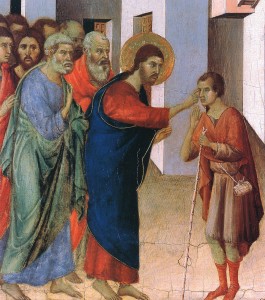Thoughts on Today’s Lessons for Sunday, March 30, 2014
God is no longer satisfied with King Saul, so Samuel, prophet and judge, gets orders to find the new king that God has chosen. It takes a while for him to work his way down to David, a handsome lad but the youngest of Jesse’s sons, so far down Samuel’s list that he had been left out in the fields to watch the sheep. Christians celebrate this story because prophets foretold that the Messiah would come in David’s line. But it also offers us a simple lesson for our daily lives: “Don’t judge a book by its cover. Look inside and learn.”
Psalm: Psalm 23
Who doesn’t know and love the 23rd Psalm? It brings comfort in time of trouble and trial, reminding us that in our darkest hours and most threatening times, God walks with us, protects us and comforts us. Ancient tradition held that David himself wrote these verses. Most modern scholars doubt that. But kings and commoners alike can take joy from knowing that God’s rod and staff comfort us, and God’s goodness and mercy follow us all the days of our lives.
Second Reading: Ephesians 5:8-14
This short letter, probably written in Paul’s name a generation or more after his death, contains some problems for modern Christians who take it out of its historical and cultural context. It appears to sanction slavery, for example, and it firmly puts women in their place as “subject” to their husbands. Today’s short reading, however, offers a poetic view of light against darkness, perhaps echoing John’s vision of Jesus as the light shining in the darkness, and pointing us toward today’s Gospel about the man born blind.
Gospel: John 9:1-41
Speaking of harsh ideas that linger from ancient times, the sad notion that blindness and other disabilities reflect God’s punishment for one’s sins or the sins of one’s parents has been hard to overcome, despite Jesus’ emphasis that God does no such thing. Rather, the very words that the man born blind utters upon his healing make the case for grace, not punishment, as we hear them in one of Christianity’s most beloved hymns: “I once was lost, but now am found … Was blind, but now I see.”

